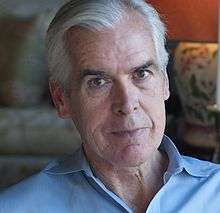Philip K. Howard
| Philip K. Howard | |
|---|---|
 Philip K. Howard | |
| Website | |
|
philipkhoward |
Philip K. Howard is an American lawyer and writer. He has written on the effects of modern law and bureaucracy on human behavior and the workings of society. He started Common Good, a nonpartisan, nonprofit organization which advocates simplifying government.[1] In August 2016, Common Good launched a "Take Charge" campaign.[2]
Work
Howard is the author of The Death of Common Sense (1995), The Collapse of the Common Good (2002), Life Without Lawyers (2009), and The Rule of Nobody (2014).
Howard has proposed reform of the handling of medical malpractice suits.[3]
He presented at the 2010 TED conference with a talk titled Four Ways to Fix a Broken Legal System. [4]
In April 2017, he joined Donald Trump's Strategic and Policy Forum.[5][6]
Howard is a former chairman of the Municipal Art Society of New York.[7]
Reception
In September 2010, New York Times columnist David Brooks highlighted Howard’s work on “the responsibility deficit” and embraced his solution for a “great streamlining,” calling it “the crucial theme of the moment”.[8] Bill Bradley praised Howard’s Life Without Lawyers as “a real wake-up call from one of America’s finest public minds,”[9] while Washington Post columnist George Will deemed it “2009’s most needed book on public affairs.”[10] In November 2010, Howard was a guest on The Daily Show with Jon Stewart, where he talked about starting a movement to streamline government and restore individual responsibility at every level of society.[11] He made follow-up appearances in May 2011[12] after the re-release of The Death of Common Sense and in June 2014[13] after the release of The Rule of Nobody’'.
Trial lawyers and consumer groups are Howard's most vocal critics. They have accused him of having a “deep disregard for public use of the justice system”[14] and favoring corporate over consumer interests. He has also been accused of offering a vision of American society that is too narrow, as Dahlia Lithwick writes in her Newsweek review of Life Without Lawyers: “… the one thing scarier than a bus full of lawyers is a bus without them.”[15]
The Rule of Nobody was among the finalists for the Hayek Book Prize of the Manhattan Institute in both 2015[16] and 2016.[17]
Publications
- Howard, Philip K. (1994). The Death of Common Sense: How Law is Suffocating America. New York: Random House (hardcover). ISBN 0-679-42994-8.
- Howard, Philip K. (2002). The Collapse of the Common Good: How America's Lawsuit Culture Undermines Our Freedom. New York: Ballantine Books (paperback). ISBN 978-0-345-43871-3. (originally titled: The Lost Art of Drawing the Line)
- Howard, Philip K. (2009). Life Without Lawyers: Liberating Americans from Too Much Law. New York: W. W. Norton & Company (hardcover). ISBN 978-0-393-06566-4.
- Howard, Philip K. (2014). The Rule of Nobody: Saving America from Dead Laws and Broken Government. New York: W. W. Norton & Company (hardcover). ISBN 978-0-393-08282-1.
Howard also wrote the introduction to Al Gore's book Gore, Al (2000-01-01). Common sense government : works better and costs less. Random House. ISBN 9780679771326. OCLC 852738628.
References
- ↑ “We're Reaping What We Sue”, George McGovern & Alan K. Simpson, Wall Street Journal, 17 April 2002
- ↑ Howard, Philip; Bradley, Bill (August 1, 2016). "Who’s In Charge Around Here?". The Huffington Post.
- ↑ “Health Reform's Taboo Topic”, Philip K. Howard, Washington Post, 31 July 2009
- ↑ https://www.ted.com/talks/philip_howard
- ↑ "Another CEO meeting at 1600 Pennsylvania". POLITICO. Retrieved 2017-04-25.
- ↑ "Remarks by President Trump in Strategic and Policy CEO Discussion". whitehouse.gov. 2017-04-11. Retrieved 2017-04-25.
- ↑ http://www.mas.org/mas-names-david-m-childs-as-new-chairman/
- ↑ "The Responsibility Deficit", David Brooks, The New York Times, 23 September 2010
- ↑ Philip K. Howard, Life Without Lawyers: Liberating Americans from Too Much Law, W. W. Norton, January 2009 (book jacket)
- ↑ "Litigation Nation", George Will, Washington Post, 11 January 2009
- ↑ Philip K. Howard interview, The Daily Show with Jon Stewart, 18 November 2010
- ↑ Philip K. Howard interview, The Daily Show with Jon Stewart, 2 May 2011
- ↑ Philip K. Howard interview, The Daily Show with Jon Stewart, 9 June 2014
- ↑ “The Truth About Philip Howard’s ‘Common Good’” p. 3, The Foundation for Taxpayer and Consumer Rights
- ↑ “Imagining Life Without Lawyers”, Dahlia Lithwick, Newsweek, 31 January 2009
- ↑ Manhattan Institute (January 29, 2015). "The Manhattan Institute Announces Shortlist for Hayek Book Prize" (PDF).
- ↑ Manhattan Institute (April 13, 2016). "Manhattan Institute Announces Hayek Book Prize Winner".
External links
- PhilipKHoward.com personal website
- CommonGood.org Common Good, the nonprofit Howard founded